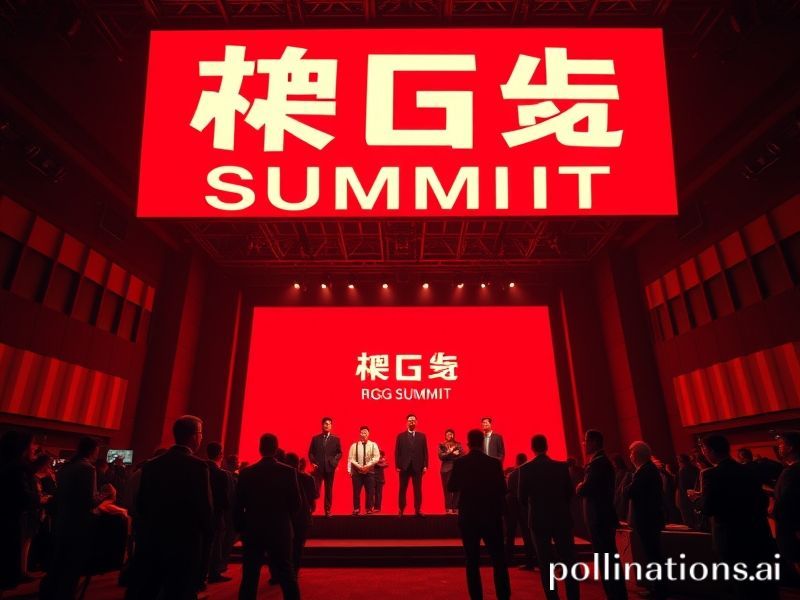Apocalypse Draft: Inside the RGG Summit Where Nations Haggle Over the Last Shreds of Tomorrow
The RGG Summit—short, appropriately, for the “Really Grim Gathering”—wrapped up this week in a decommissioned submarine pen outside Reykjavík, proving once again that the world’s most consequential conversations happen wherever the coffee is worst. Delegates from 47 nations, three breakaway republics you’ve never heard of, and one micronation run by a crypto baron in a Hawaiian shirt gathered to discuss nothing less than the next decade of global resource rationing, digital sovereignty, and the etiquette of apologizing for methane leaks.
Official communiqués call it the “Resource-Governance-Grid Summit,” a name so bland it could only have emerged from a multilateral committee that met for nine months just to agree on hyphen placement. Unofficially, everyone calls it the “Apocalypse Draft,” because what’s really being allocated here isn’t lithium or bandwidth but the right to keep pretending the 21st century still has guardrails.
The summit’s setting was no accident. Iceland volunteered its old NATO bunker for the same reason your cousin volunteers the shed for Thanksgiving: nobody else wanted the liability, and the neighbors are too polite to object. Inside, the air tasted of recycled despair and artisanal kelp snacks. Outside, the North Atlantic performed its usual audition for climate-catastrophe stock footage, flinging sleet at windows like a drunk process server.
America arrived with 200 staffers, a portable McDonald’s, and the unspoken understanding that any final agreement would ultimately be ratified in a Delaware filing cabinet. China sent a delegation half that size, each member fluent in the art of smiling while blocking consensus. The EU turned up as a single, hydra-headed organism still bickering with itself over seating charts. Meanwhile, the African Union delegation—whose continent is both the richest in unmined minerals and poorest in air-conditioning—watched the theatrics with the weary amusement of adults supervising a toddlers’ birthday party where the clown has brought a flamethrower.
The main drama orbited around Article 9, the so-called “Kill-Switch Clause.” In plain English, it allows any signatory to remotely disable another’s energy grid if they feel the global thermostat edging past 1.7°C. Picture a nuclear option, but with Wi-Fi. Smaller nations demanded veto rights; larger ones offered “consultation periods” roughly as binding as a pinky promise at last call. After 36 hours of circular debate, the clause stayed in, festooned with enough addenda to wallpaper the Sistine Chapel. Everyone declared victory, then rushed to leak contradictory interpretations to their domestic press.
Parallel panels plumbed deeper absurdities. One session, moderated by a former Netflix algorithm ethicist now advising the UN, asked whether cloud-computing emissions should be taxed at the point of upload or download. Another featured a Silicon Valley guru pitching “geo-engineered nostalgia”—spraying the stratosphere with reflective particles calibrated to remind humanity of 1997, a simpler time when the biggest scandal involved a president and a cigar. Attendees clapped politely, then checked how many carbon credits such nostalgia would burn.
The real action, naturally, happened in the smokers’ corral, a wind-blasted concrete balcony where ministers traded concessions like Pokémon cards. Here, the French delegate swapped fishing rights off Kerguelen for a slice of Portugal’s cobalt reserves, while Russia offered discounted Arctic shipping in exchange for everyone pretending not to notice certain “gray-hull” tankers. A junior aide from Tuvalu tried to auction future citizenship rights to climate refugees, only to discover the market had already been cornered by Goldman Sachs.
By the closing ceremony—held under emergency lighting after the backup generator staged its own labor action—the summit had produced a 200-page document that guarantees nothing except future summits. Each nation left clutching a different page, each paragraph translated into a slightly different shade of legalese. The Icelandic hosts, ever gracious, handed out souvenir lava rocks labeled “Your Share of the Planet,” a gag so bleak it drew an audible sob from the delegate representing the Maldives.
And so the RGG caravan disbands, its participants scattering like dandelion seeds in a hurricane, each promising to “operationalize synergies” and “mainstream resilience” until the next gathering, already penciled in for Dubai, where the air-conditioning will be fierce and the cognitive dissonance fiercer. Humanity, ever optimistic, will call this progress. The planet, busy compiling receipts, will call it what it is: a polite form of procrastination on the edge of the abyss, with hors d’oeuvres.







